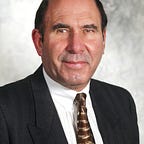The Red Brick Road To Fenway
Joel B. Levine MD
Sunday was a day when I felt really normal. Not that I feel abnormal at other times but Sunday was when I had recognizable, comfortable, genuine, magnanimous feelings. These were feelings that were part of my childhood, my college years, memories of my son and his sons, all in continuity of emotions that were simply true and my own. I had just watched one hell of a Red Sox baseball game.
Red Sox baseball is a slow sport, a game of inches, be it where you hit or pitch the ball or where you position yourself. It is an opera in spit, a soap opera in emotion, a mystery of “ who will do it”, a comedy of errors, and, if lucky enough, a musical of the Sweetest Caroline. Note that I distinguished Red Sox baseball from generic baseball. To the uninitiated all teams look the same, the game the same, more or less. But for those of us who know better, Boston baseball remains the most unique sports experience to have, or said another way, to live.
For those who do not know, walking to Fenway Park, from wherever you start, is being in the best parade. Thousands coalesce, like on the roads to Rome, Chaucer’s pilgrims along the streets of Boston. This river flows in one direction, to its headwaters, to the Ganges of Grass.
I realize that we rarely see joyous humanity anymore. No political fever here, nor anger (perhaps a bit of inchoate hatred of the Yankees), no confusion of purpose. Feeling joyous humanity is really far better than shared anger at anything. Bonding becomes natural and knows no boundary. We walk in a ritual of communion with the gods of Fenway.
At the end of the river, you gather at a shrine. Fenway Park is as it was. When you were a child, or back from college, or with your folks, or with your own children, it the same. Some people have sat in the same seat, same row same number for generations. There have been improvements, so to speak, but nothing has altered what you feel emerging from the dark of the tunnels, up the ramps, seeing, as you would expect in Boston, the most Irish green of grass. Imagine that short traverse, holding the hand of your father, the hand of your son or the hand of your father again, half a century later.
You get to Fenway early enough to do nothing. You watch people, ball players in repose, food being cooked and conjured as in “ grilled Sausage “delecto””. Whatever is actually in the world is gone, what is in your life, outside of Fenway, is gone. It should require a mystic to explain becoming one with the Sausage. But for those who know, a misty nod will suffice.
What you also realize is that, in Fenway, there is no place even for the most fashionable of differences. The Red Sox are replete with colors, languages, even translators into Japanese, but no one notices. When there is something people care about, all else fades away. Winning the game requires supporting all, not some, of the players. Winning the game requires having the right skill set at the right time with little call for a race based accounting of innings pitched in relief. Yesterday, Hispanic Christian Vazquez won the game in 13 innings; Canada’s Nick Piveta pitched brilliantly in relief. If you wanted, “ it takes a village’, this is a good example.
Sure it is a game but it reveals so much. The metric is skill, the contest rigorous, and the risk evident. If you want micro-aggressions, ask the umpires. We sing the anthem, we bow heads, we remember and cry when Williams or Remy, are brought by golf cart to the place that enshrines them. We pay homage to a history; unrevised, just remembered.
This is as American as you can get and for all the right reasons. This is not a field of dreams but of dreamers remembering when Boggs could count the stitches on the ball coming at him at 95 miles an hour. If you ever stood in a batting cage , you know how insane that is.
Bart Giamatti said it perfectly,
“As I grew up, I knew that as a building (Fenway Park) was on the level of Mount Olympus, the Pyramid at Giza, the nation’s capitol, the czar’s Winter Palace, and the Louvre — except, of course, that it is better than all of those inconsequential places”
